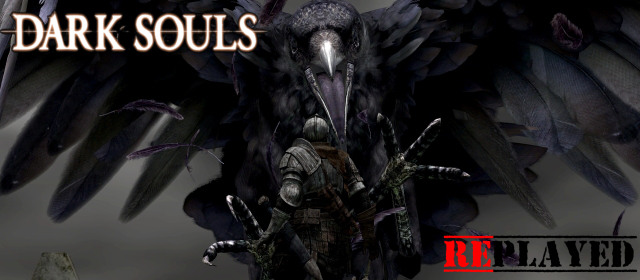There’s a lot of debate these days about the difficulty of modern games and, quite frankly, I’m of the opinion that a lot of games are too easy, or else hamstrung by difficulty spikes caused by either poor testing or a developer’s misguided attempt to inject some challenge. Some of the best modern games have suffered from issues with difficulty – take BioShock, for example, a game which is made ridiculously easy by the overpowering plasmids and the instant respawn Vita-chambers.
It falls to the likes of Super Meat Boy and N+ to deliver a genuine challenge, indie titles that wouldn’t have been out of place in the 16-bit era alongside games like MegaMan X and Super Ghouls & Ghosts that were separating the men from the boys when I was a wee slip of a lad. Triple-A games have their share of challenge, sure, but it’s tempered by adjustable difficulty levels, cushy checkpoints and quick-saves. Gone are the days when games made you work, really work, for that end screen. No matter what game you begin now, you know you’ll reach the end. It’s not if, but when you finish it. No one is afraid to face a game, because the fear of failure has been taken away.
But every now and then, a game comes along that wants to test your actual skill, that wants to push you, that doesn’t care if you reach the final cutscene and see the celebrity voice actors mo-capping a happy ending. A game that wants you to fail, and rage-quit, and come back, and try harder, and get better, and succeed.
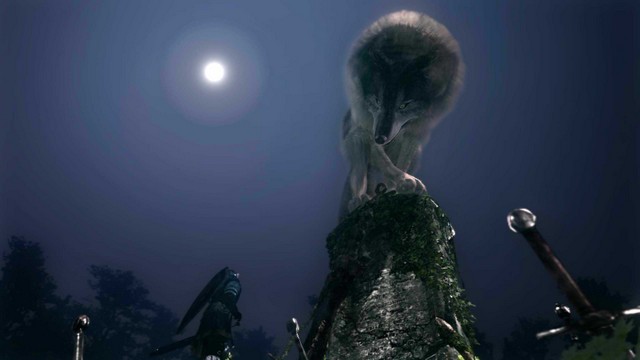
SOUL ASYLUM: Before I go on, I should point out that I’m no video game warrior. Once upon a time I’d have spent hundreds of hours rinsing a single game and chasing the elusive 100%, but the pressures of my adult life and “grown up” responsibilities mean I rarely get to play any one game extensively or exclusively. I’ve never 1000-pointed or platinum’d anything, and I see no shame in dropping the difficulty when a game gets so tough it threatens to spoil my enjoyment. Gaming shouldn’t ever be a slog – that goes against the entire ethos of gaming as a pastime – and I’ve gone through my share of titles on Easy just to reach the end.
But – and here’s the point I’m actually making – it’s a completely different situation when a game is designed to be hard, when a game is built to be a challenge, not made insurmountable by false challenge; more enemies, lower shields, less power-ups to collect. That’s bullshit, and never truly representative of what the game actually is – that’s what Normal mode is, for Goodness’ sake. But when a developer takes the time to balance a game with such care and attention that anyone, with enough patience, practice and understanding of the mechanics can reach the end, that’s genuinely incredible, and genuinely rare.
From Software almost, almost, managed it with 2009 PS3 exclusive Demon’s Souls, a game that wasn’t looking to win any popularity contests, but greeted gamers with a ringing, resounding challenge to take up arms and make it to the end. A loose, mostly nonsensical story and an almost unfathomable world created a sense of bewilderment that combined with the consequences of failure to leave the player feeling like they truly were facing off against the darkness of hell all alone. It wasn’t perfect, and there was room for refinement, for a tightening of the balance, for more variety in the world. In 2011, From Software answered the call, and then some.
FROM THE DARK, THEY CAME: Taking the franchise multi-platform, they created Dark Souls, a title that, on the outside at least, is almost identical to Demon’s Souls. By the time of its release, From Software knew their audience. They knew that the only gamers who would even bother to pick up Dark Souls would be those seeking a worthy adversary, and they designed Dark Souls to be just that: a sprawling open world with no set paths and no set objectives besides banishing the evil that plagued the kingdom of Lordran. No princesses to save, no ancient artefacts to protect, no unique destiny to manifest; Dark Souls is all about your nameless protagonist and the deep mire in which they find themselves.
There isn’t much of a story, and even when you reach the end it’s not entirely cleared up as the few questions that are addressed are answered with deliberate ambiguity. In so far as I can tell, the humans of Lordran were once beholden to Dragons, ancient beings with scales of solid stone. The humans worshipped fire, and within the flames found the “souls of Lords”. Five powerful entities arose: Gwyn, the Lord of Sunlight with an army of towering knights at his back; Nito, the “First of the Dead”, a God-like being that spread death and disease amongst the Dragons; the Witch of Izilith, whose Daughters of Chaos used their own fire to burn away the dragon’s scales; the Furtive Pygmy, a mysterious creature almost out of place among the others; and Seeth the Scaleless, a mutated Dragon who betrayed his own kind to bring about their downfall.
These Lords defeated the Dragons and ushered in the Age of Fire, a golden era for the people of Lordran, but damned themselves in the process. After an undisclosed number of centuries, the fires they lit are burning out, and darkness is creeping back to Lordran. For reasons never made clear, there are individuals born with a Darksign, a cursed sigil inscribed in the palm of their hand that singles them out as heroes, of a sort, who can die and rise again many times – and whose destiny is tied directly to the fate of Lordran. Which is, of course, where you come in – the direct descendant of the Pygmy, and the prophesied possessor of the Dark Soul, who alone can extinguish the Flame and bring balance to Lordran.
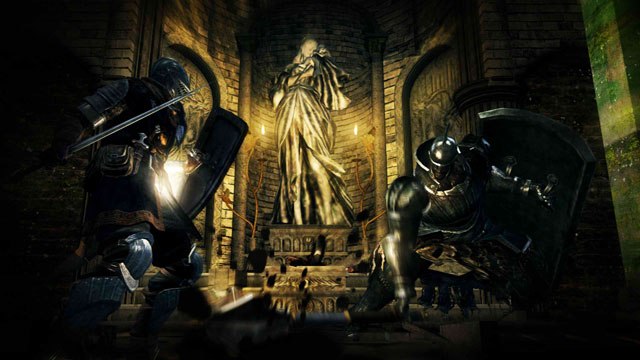
PREPARE TO DIE: The first thing that becomes apparent is that this is a brighter world than that of Demon’s Souls. Lordran has a wonderful depth and variety of locations, and aesthetically speaking it’s beautiful in many places. It’s not all set at night, it’s not all bleak and grim; there are marble palaces, forests and lakes and, for those lucky enough to reach Anor Londo, a great city of gold bathed in sunlight.
The world is open, as opposed to the more structured hub-zone layout of Demon’s Souls, but that doesn’t mean you can tackle areas in any order you choose. Well, you can, but you will die. This is not the prediction of a possible outcome of exploring Lordran’s ruins in the wrong order, this is not speculation or conjecture; this is fact. Lordran will kill you if you don’t respect Her. Initially, there are several paths open to you, but at the very start, as you enter the world with your nameless, class-less adventurer, the only way is up, into the ruins of an ancient fortress and the bell tower that overshadows it.
At this point, you will be dead (though yet to become “Hollow”, a horrific state in which the undead turn murderously insane). You begin the game imprisoned, and your escape will see you face the first towering boss. I’ve seen it beaten by gamers much more skilled than I through the magical medium of YouTube, but it’s fair to say that 9 out of 10 of you will be killed in that first fight, armed as you are with rusty weapons and the kind of enthusiasm that only exists when you’re unaware of what you’ve gotten yourself into. Save yourself the trouble and forget about rage and pride and prepare to die – it’s the only way to enjoy Dark Souls.
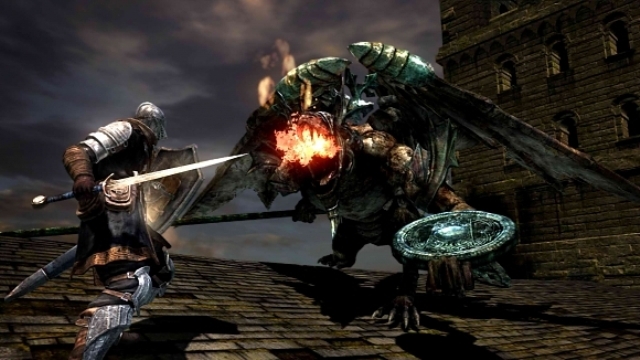
FACE YOUR FEAR: The trick to getting the most out of Dark Souls is accepting that it’s going to punish you. Sometimes it won’t seem fair; sometimes it will seem downright cheap – but it’s important to remember that From Software never intended anyone to run through this game in 8 hours. It’s a massive RPG with 70+ hours of game-time, not to mention a deliberate difficulty curve that will make you its quivering bitch if you go into it with the wrong attitude.
Combat is too intense to be accused of being button-mashery, and every move you make has to be considered. Evading, blocking and attacking consumes your stamina – run out and you’ll barely be able to lift your sword. The trick with lesser enemies is to watch their attack patterns and, wherever possible, use the lock-on to roll around them and execute a powerful backstab. Jumping into a fight head-on will often kill you, especially in the early hours.
Bosses are even more terrifying. Dark Souls has over two-dozen unique boss creatures, and each one will test your skills and reflexes to the limit. From the early-game Taurus Demon who requires a little brain-work to defeat, to the Gaping Dragon who repeatedly one-shotted me after I’d whittled it’s health down to under 5%, to Ornstein and Smough, the Dragon-slaying duo at the end of Anor Londo who I spent four solid hours fighting before I finally got the better of them. A boss in Dark Souls is often a terrifying mammoth that will take an age to bring down – but the sense of accomplishment and satisfaction you get from defeating them is simply unparalleled. Those who argue that Dark Souls is no fun, unfair and mean-spirited almost certainly have never drank in the soul of a slain boss after a two-hour contest.
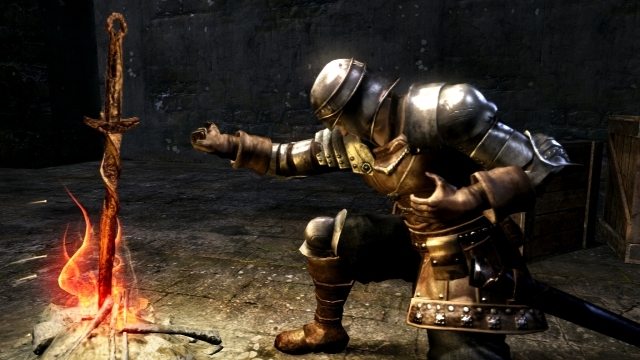
A MATTER OF LIFE AND DEATH: As much as your gear and combat style, your mortal status matters in Dark Souls. Throughout the game you collect “Humanity” which can be used at bonfires to resurrect your character and make him or her human. Being corporeal has its own benefits, such as a higher chance of finding rare items, a greater potency in your magic and the privilege of conversing with certain NPCs who won’t treat you the same if you’re dead.
Humanity can be stored along with the souls of the fallen, but unlike souls it won’t be lost if you die, only if you use it up. While it’s not essential to play the game as a human, you must be vital in order to “kindle” bonfires, the only equivalent of save points in Dark Souls. At bonfires you can rest, save your character progress and spend souls to level up your attributes (later in the game you can even use certain fires to fast travel), or, if nothing else, they’re just a safe place to sit and shiver before heading once more into the fray.
Dragon’s Dogma and The Witcher 2: Assassins of Kings share similarities with Dark Souls in that you must be prepared at all times before venturing into the world, and a lack of foresight and patience will almost certainly see you dead. Even smaller enemies can be incredibly damaging, such as a nightmarish breed of giant frog that can curse you, killing you instantly and leaving you with reduced health when you respawn, and unable to use Humanity until the curse is lifted – worse still, the cure is rare and not easy to come by. As in Demon’s Souls before it, dying will leave a bloodstain on the ground containing all of your collected souls (the currency with which you level up and upgrade or buy equipment). If you make it back in once piece, you can retrieve the lost goodies; if you die on the way, they’re lost forever. If you want to hold on to your precious souls, even returning to the site of your inglorious death requires careful planning.
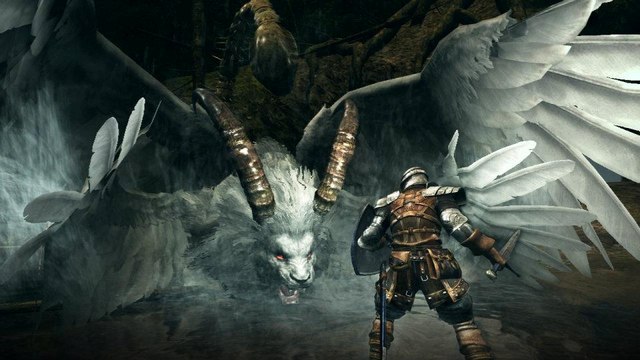
MISERY LOVES COMPANY: Of course, you can always call in back-up. Although the online element of Dark Souls doesn’t allow for full co-op, it does have its own unique brand of multiplayer. Not only can you leave messages for other players, hinting at lurking dangers or hidden pick-ups, you can also use a special artefact to leave a kind of signature in certain areas, through which other players can summon you into their game to help them with a particularly tough fight (or you can summon them, of course). The souls harvested are halved, but the glory is very much yours when a colossal monstrosity finally succumbs to your united assault.
Combined with the ability to invade another player’s game and either grief them or aid them, the fact that certain NPCs can also be summoned if you possess the necessary items adds to Dark Souls’ labyrinthine breadth; a breadth that includes hidden paths, unlockable shortcuts, secret vendors and optional bosses. Taking certain paths will circumvent a number of truly tough battles – but doing so will often mean you miss out on rare and precious weapons or armour. For example, any boss with a tail will often spawn a unique weapon if said appendage is removed – try it with the red Dragon in the first area, if you can, as the sword it rewards you with is invaluable for the early part of the game.
Aside the unique weapons and powerful armour sets you can find, there aren’t many ways to get ahead without simply getting good. There are very few decent soul-farming areas (one of the best lies beyond the sealed, carved door beside the first bonfire in the dark forest) and on the whole, you’re on your own. If you get really deflated by it all, you can always take solace in the fact that everyone else has struggled in the same way as you (well, except this guy).
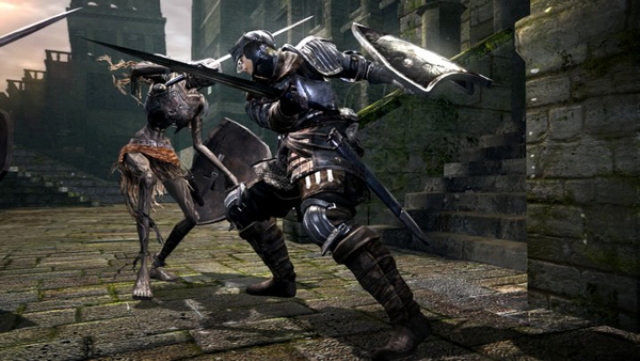
ONLY THE DARK REMAINS: What Dark Souls never does is hold your hand. It throws enemies at you in strict succession, always spawning the same nasties in the same place; it hounds you with its oppressively grim atmosphere and occasionally astounds you with an unexpected display of majesty (I know I mentioned Anor Londo already, but honestly: wow). It piles on the ambience, but never really attempts to tell its own story. That seems left to you. Why are mortals cursed with the Darksign? Why are the Lords who once saved Lordran now twisted and corrupt? What is the true destiny of your character? The game gives half answers during its hard fought-for end sequence, but leaves as many questions hanging in the ether – for most, the beauty will be coming up with their own answer.
Maybe the imminent sequel will shed more light on the history of Lordran, or maybe From Software will decide to never clarify these elements. Personally, I don’t mind which. Dark Souls was my ultimate Game of the Year in 2011 and remains one of my favourite games to this day, not because of its narrative flair but because it remains unmatched in its genre for sheer playability. Yes, it’s hard. Yes, it will crush you from time to time and make no apologies for it. Yes, there are times when you will feel defeated. Dark Souls makes no hollow apologies, but instead very sincerely suggests that you deal with it. Even if you walk away for days or weeks, your cheek will feel the sting of a challenge unanswered every day until you finally dust yourself off, pick up your sword, and head once more into the darkness.


